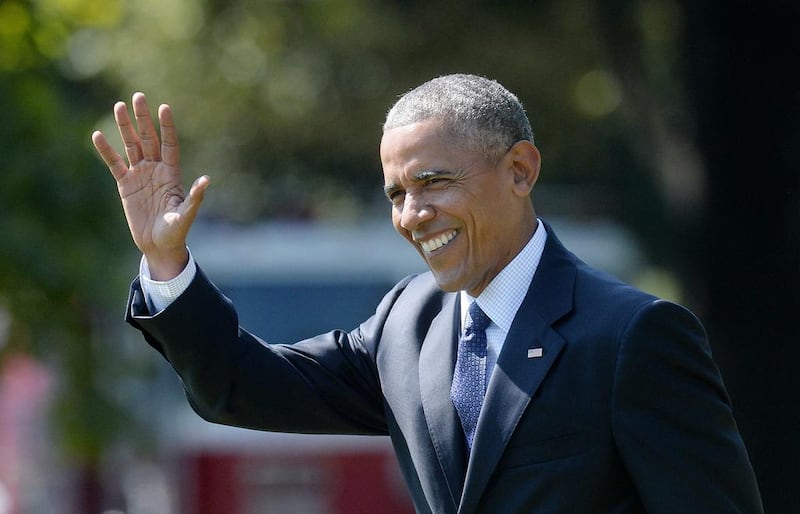In this week of Eid celebrations and cautious optimism for the ceasefire in Syria, it’s worth asking why news headlines aren’t more cheery and the global outlook is not more positive. Barack Obama recently suggested that the current melancholia is brought on because the world is a more connected – and consequently more pained – place. Addressing a gathering of young people in Laos, Mr Obama referred to the daily war – between optimism and pessimism – that each of us fights when we scroll through our mobile phones and cast an eye over our social media feeds. It’s easy, said Mr Obama, to feel that the world is worse off.
“I think we all have to recognise these are turbulent times. A lot of countries are seeing volatile politics,” he said. “But then when you look back over the course of eight years, actually you find out things have got better.” This is, he added, the best time in the world to be born.
Was that the customary patter of the consummate politician? Or is the world really in a better state today than 30, 50, 70, a hundred years ago? If it is better, how to explain Brexit? How to decode US presidential hopeful Donald Trump’s isolationist “America First” policy? How to rationalise the Islamophobic anti-immigrant rhetoric of prime minister Viktor Orban’s Hungary? Can the rise of the far-right AfD party in Germany ever be cast in anything less than doleful terms? Is there any way to read Philippines’ president Rodrigo Duterte’s carte blanche for freelance killers to target suspected drug traffickers as anything other than extrajudicial murder?
The dirge of dispiriting news is so persistent it’s not unreasonable to ask how much lower are we to fall? Can we expect to be happy in our time? Are we destined to marinate in a coarsely pulverised mix of racial, cultural and economic antipathy towards people outside the borders of our countries?
Not if Johan Norberg’s book-length buttress to Mr Obama’s assertion has any traction. The Swedish economic historian’s new book is titled Progress: Ten Reasons to Look Forward to the Future. He gives it to us straight. Average life expectancy worldwide has gone from 31 years in 1900 to 71 today. Global literacy has risen from 21 per cent in 1900 to 86 per cent in 2015. Poverty fell by 24 per cent in India between 1993 and 2012. Less than 10 per cent of humanity subsisted on less than $1.90 a day in modern money in 2015, a massive change from 37 per cent at the same level in 1990 and 44 per cent in 1981. Now, 68 per cent of the world’s population has modern sanitation, nearly double that in 1980. Slavery, which existed worldwide in 1800, has been formally banned everywhere. Most people are more literate, more free and more equal now, writes Norberg. There’s less poverty and violence in the world, never mind the daily or even hourly tidal wave of discontent and downright rage that breaks over us on social media.
So why such profound pessimism? A 2015 YouGov poll found that 71 per cent of Britons were convinced “the world is getting worse”; only 5 per cent said it was getting better. More than half said they believed world poverty was rising. A recent poll by the Chicago Council on Global Affairs found 42 per cent of Americans beset by the sorrowful belief their country was less safe than before September 11, compared with 27 per cent in a 2014 survey.
This is the sort of pessimism that has produced Brexit, a credible Trump run for the White House, an Orban-governed Hungary, AfD’s menacing rise and Mr Duterte’s legitimisation of violence in the Philippines. A huge part of it is fuelled by nostalgia for an imagined, more secure past. As one Trump supporter, a white man in his fifties, recently put it, his candidate may be his last chance to “preserve the culture I grew up in”. Ditto Brexit, Hungary and AfD. The politics of fear and despondency is in the ascendant, in turn triggering a response from those who feel they are more empathetic.
Norberg suggests that people all over the world seem increasingly able to imagine themselves in other people’s shoes and thereby better able to feel each other’s pain. There is some evidence to back this up. The world is not just better travelled. It is also more tolerant of racial, sexual and cultural difference and more nakedly hostile to prejudice premised on birth, caste and creed.
Nearly 30 years ago, for instance, less than half of Americans approved of interracial liaisons; by 2012, nearly 90 per cent did. Now, racially charged incidents routinely get enormous play on social media. Misogyny, Muslim-bashing and prejudice of all sorts are punished with social scorn after they air as a smartphone video.
In all sorts of ways then, especially awareness, the world is more in sync with itself. For those still profoundly doleful, Francois La Rochefoucauld’s 400-year-old advice still holds true: we are never so happy, or so unhappy, as we suppose ourselves to be.
Rashmee Roshan Lall is a writer on world affairs
On Twitter: @rashmeerl





